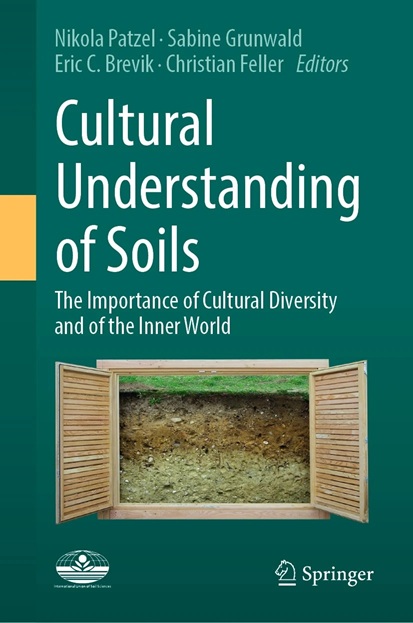Soil & Culture
Cultural perceptions of soil are diverse and often ambiguous, shaped by religious, spiritual, and secular beliefs, as well as societal values and ideas. These cultural frameworks influence how soil is understood, cared for, or degraded, sometimes aligning with or conflicting with natural conditions, scientific views, or agricultural practices. Actually all human perceptions of soil are culturally influenced, creating varied webs of meaning that shape the human-soil relationship. Addressing this requires fostering soil awareness and promoting inter- and intra-cultural dialogue to integrate diverse knowledge and practices.

To serve this aim, the International Union of Soil Sciences (IUSS) founded a working group on Cultural Patterns of Soil Understanding that has resulted in the book Cultural Understanding of Soils. The importance of cultural diversity and of the inner world.
It presents studies from almost all continents, written by soil scientists and experts from other disciplines. A primary objective of this project is to promote intercultural literacy that allows readers to appreciate soil across disciplinary and cultural boundaries in an increasingly globalized world. . .
EARTHBOUND. CARING FOR THE SOIL
People in the West, including scientists, still tend to think of nature in terms of mere matter. Mechanistic assumptions about the world have led the late capitalist system to overuse and exploit soils for ever more intensive and ‘efficient’ food production. Today, soils are under threat all over our troubled planet. To address the problem of their degradation instead of continuing to think of them as a resource and therefore only as a means to an end, perhaps we could put soil at the centre? Instead of seeing it as something that needs to be fixed to serve and feed a growing human population, perhaps we could relearn to approach it with curiosity – and care.
We have become used to thinking of nature as the background to our history and politics (1). But the environment is more than just a stage for our culture and an object of scientific inquiry. Although the West has ignored or even denied our dependence on it, claiming the superiority and exceptionality of man and placing him at the top of the ladder of life, it is undeniable that multiple ecological and climate crises are now hitting us hard (2). We learn through bitter experiences that our lives depend on the ecosystems and ecologies we have disturbed (3). We are rooted in these ecosystems, for our social life emerges through and in particular places and landscapes (4). This dependency is well understood by many indigenous communities – they say they are who they are because they are where they are (5) – but still not recognised in the West. This is because it would ultimately force us to question our culture’s central values, such as economic growth, private ownership and the primacy of individualism.
Despite this reluctance, we should consider soil not as a degraded resource but as a vital element of our social reality. In practice, this would mean approaching it with caring intention and taking responsibility for its sustainability. Indeed, this is what many soil scientists are doing. However, it also requires approaching soil not just as an abstract and distant model but as a local and up-close part of our reality. Caring requires attention and contact, which are particular – and with a particular. Attention builds recognition and responsibility. These cares and responsibilities, in turn, give us a sense of belonging and community, which are so much needed in times of loneliness, alienation, and diminished hope for the future. So let’s breathe in the scent of geosmin – and let it guide us to the recognition of our earthly belonging.
Dr Małgorzata Zofia Kowalska
Małgorzata Zofia Kowalska, PhD. The author is an assistant professor of social anthropology at the Institute of Anthropology and Ethnology at Adam Mickiewicz University in Poznań. Interested in human relations with the environment, she recently completed a fellowship within the Biodiverse Anthropocene programme at the University of Oulu. As Principal Investigator of a project funded by the National Science Centre (Natura 2000 as a multispecies network of dependencies. Non-obvious relations in anthropological perspective, 2021/43/D/HS3/02018), she has looked at the ecology of the Natura 2000 site as a web of social relations. Co-founder of the interdisciplinary Research Centre for Energy and Environmental Challenges. Not to be found on social media, she is rather offline, outdoors.
1 Plumwood, Val, Feminism and the Mastery of Culture, Routledge 1993.
2 Amitav Ghosh, The Great Derangement. Climate Change and the Unthinkable, Penguin Books 2016.
3 Bateson, Gregory, Steps to an Ecology of Mind, The University of Chicago Press 2000 [1972].
4 Ingold, Tim, Anthropology beyond humanity, Suomen Antropologi: Journal of the Finnish Anthropological Society. 38 (3): 5-23, 2013.
5 Graham, Mary, Aboriginal notions of relationality and positionalism: a reply to Weber, Global Discourse, Vol. 4, No. 1: 17–22, 2014.
